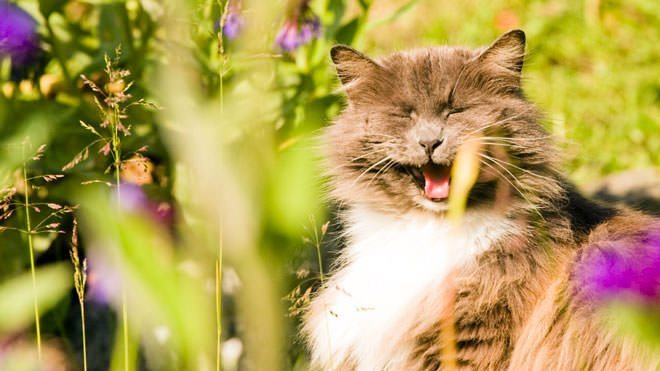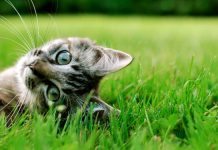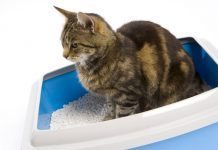
Like dogs, cats love to eat grass. You may not know the exact reason, you think they do it for to cleanse their systems or because they like the taste of some plants and flowers. Apart from the famous catfish ( Napeta Cataria ) which is our cat’s favorite type of grass, nibbling on plants of various kinds is usually a very healthy thing for cats to do, but it can also be very dangerous. Let’s find out what are the poisonous flowers and plants for cats, by analyzing the symptoms of poisoning in case of ingestion.
Here are some poisonous herbs and plants for cats:
- Monks hood: it causes gastrointestinal problems and high doses of nervous and cardiac depression;
- Holly: causes vomiting and diarrhea in the cat ;
- Laurel: gastrointestinal and neuromuscular problems;
- Bosso: gastrointestinal problems;
- Autumn Crocus: It’s one of the worst among the toxic cats for cats. It causes problems of breathing, vomiting, blood in the stools, and liver and kidney damage;
- Hippocast: The cat will vomit and have diarrhea;
- Ligust: causes the cat gastrointestinal problems ;
- Hernaria: it causes problems with the mouth, triggers vomiting and makes the cat breathing difficult;
- Poppy: causes gastrointestinal problems, the nervous system and the heart;
- Sambuco: causes gastrointestinal problems.

Poisonous ornamental plants and flowers for cats
- Azalea: causes gastrointestinal, neurological and even cardiac disorders;
- Caladio: leaves cause inflammation in the mouth of the cat ;
- Calancola: may cause vomiting in the cat , diarrhea and heart arrhythmia;
- Cyclamen: The toxic part is the root, so it is rare to poison. If ingested, they cause vomiting and in more severe cases, they lead the cat to death;
- Dieffenbachia: causes irritation to the mucous membranes of the oral cavity, nausea and vomiting;
- Ivy: it causes gastrointestinal problems, identifiable by vomiting and cat with diarrhea ;
- Jasmine: causes problems of balance, blurred vision, convulsions and often respiratory failure;
- Lily: causes kidney failure and stomatitis in the cat ;
- Iris: ingestion of the plant causes problems with the gastrointestinal system;
- Lily of the Valley: causes vomiting, diarrhea, syncope and heart failure;
- Narcissus: In cases of mild poisoning, it causes skin irritation and swelling in the mouth . In the most severe cases: diarrhea, arrhythmia and respiratory difficulties;
- Oleandro: he is responsible for gastrointestinal, neurological and cardiac problems;
- Horticulture: causes vomiting and dysentery in the cat ;
- Christmas star: causes irritation, wounds and inflammation of the mouth, eyes and digestive tract;
- Tulip: The most dangerous part is the bulb, if ingested causes vomiting, diarrhea and in severe cases, increased respiratory and cardiac rhythm;
- Mistletoe: causes vomiting and diarrhea.

How to Prevent Poisoning and What to Do
If you have a cat eating plants and flowers you can try two simple tricks; especially to ward off the potential ingestion of some of the poisonous plants for cats listed above. The first one is to make a pot with his favorite herb available to your cat: catnip.
The second is to sprinkle lemon on dangerous plants for cats ; lemon is safe for your plants and will save the lives of your kitty!

Symptoms of Cat Poisoning
Obviously, if you suspect you have a cat intoxicated by a poisonous plant , the first thing to do is take it to your veterinarian immediately! The first symptoms of intoxication can be attributed to the cat sneezing repeatedly , tongue ulcers, poor salivation and coughing in the cat .
Once the toxic substance has been absorbed by the body, other symptoms of poisoning may occur such as: collapse, vomiting, convulsion, tremors in the cat , spasms, bleeding and stiffening. Once you arrive at the vet, they would suggest methods for inducing vomiting in your cat in order to remove the ingested substance.
IMPORTANT! If you have an intoxicated cat , do not take action! Don’t try any home remedies like milk, oil, salt and don’t try to make it vomit if you do not know what it’s ingested, you could worsen the situation! Only follow the instructions of your veterinarian.














